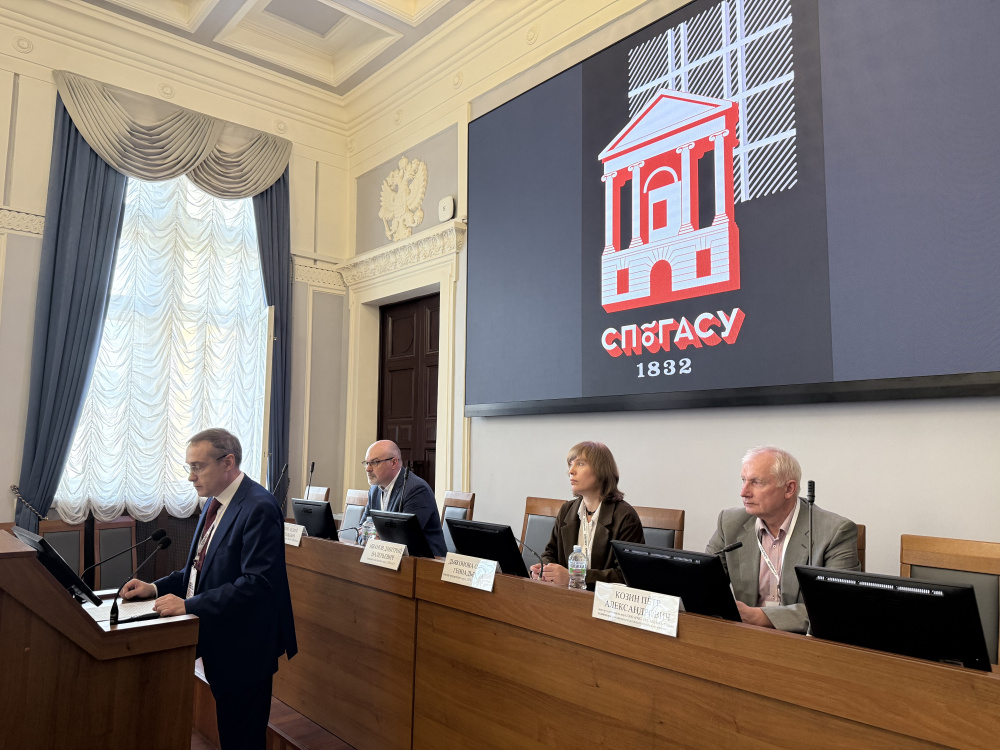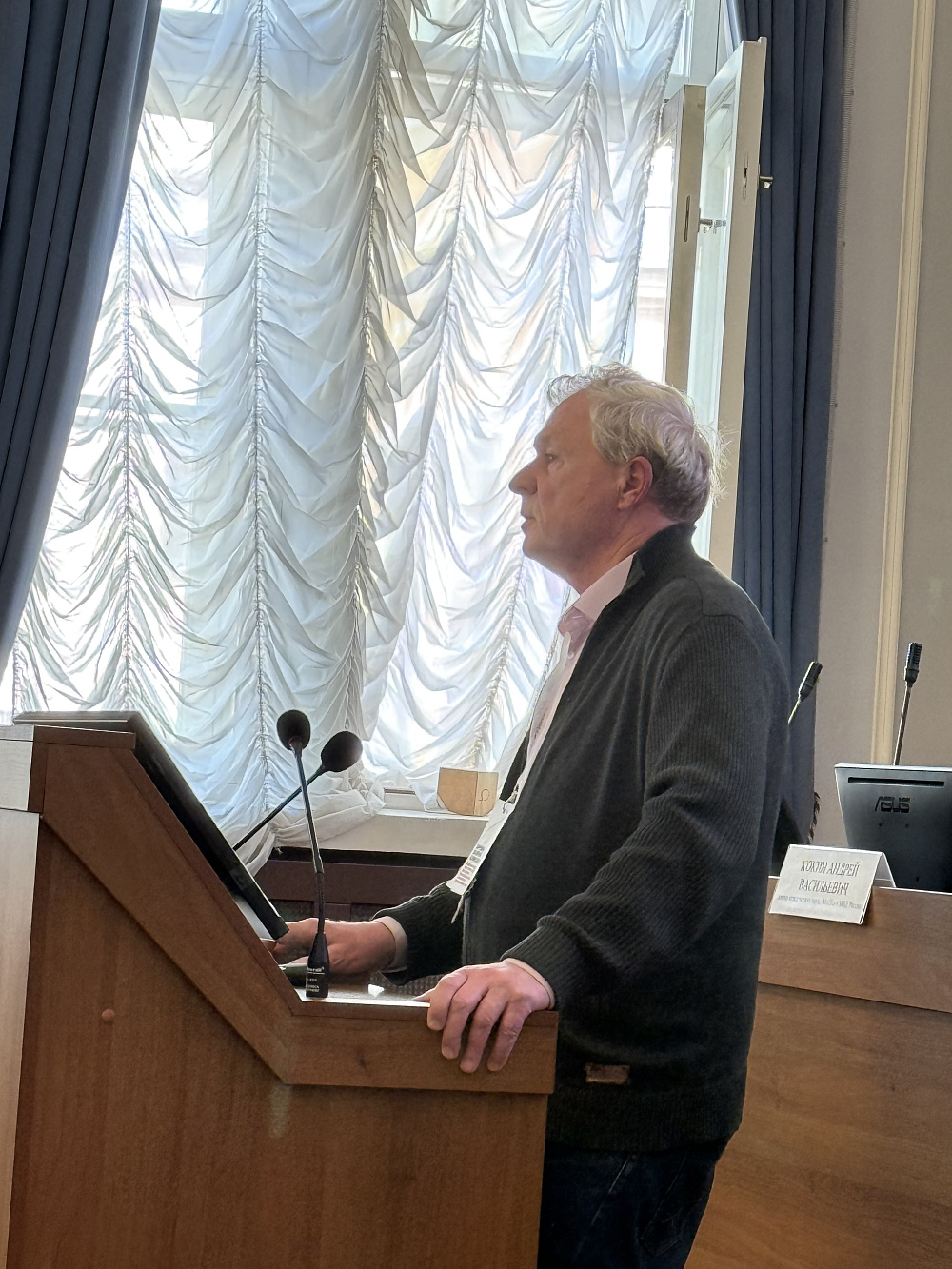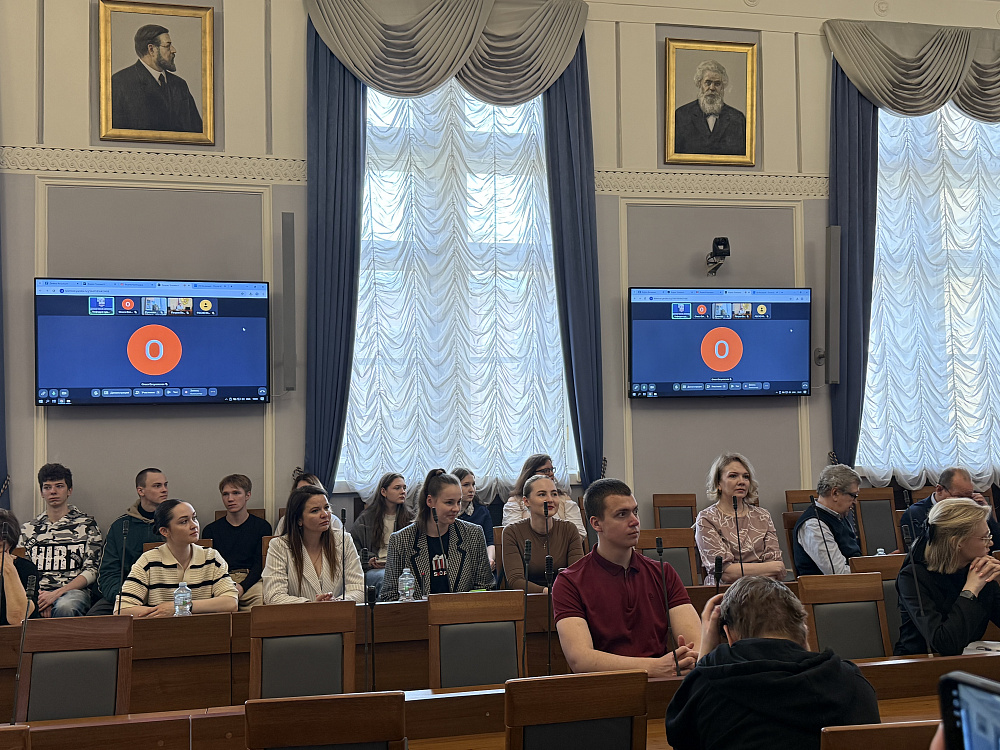 Dmitry Ivanov (behind the podium), Andrey Kokin, Oksana Dyakonova and Petr Kozin
Dmitry Ivanov (behind the podium), Andrey Kokin, Oksana Dyakonova and Petr Kozin
SPbGASU hosted the National (All-Russian) scientific and practical conference "Improving training of forensic experts and performance of forensic examinations in modern conditions". Current issues of professional training of forensic experts, modern technical and scientific-methodological support for the production of forensic examinations, as well as issues of legal, informational, financial and organizational support for forensic activities were discussed at a plenary session, two sections and at the podium of young scientists. In total, about 90 specialists and students from different regions of the country presented their reports.
Opening the plenary session, Dmitry Ivanov, Chairman of the Organizing and Scientific Committees of the conference, Dean of the SPbGASU Faculty of Forensics and Law in Construction and Transport, noted that the scientific community and the industry need to gather at one site, exchange experiences, discuss current problems and consider their possible solutions. He read out an address from the Rector of SPbGASU Evgeny Rybnov, who emphasized the importance of the presence at the conference of representatives of both the professional community, leading scientists, and students, whose ideas and initiatives will contribute to expanding the potential of the conference and successful solving its tasks. "The conference is intended to become an effective platform for constructive dialogue on issues, including improving the quality of education," the address said.
To eliminate subjective opinion
In his report, Professor at the Department of Weapons Science and Trace Science of the Educational and Scientific Complex of Forensic Examinations of the Moscow University of the Ministry of Internal Affairs of Russia named after V. Ya. Kikot, Chief State Forensic Expert of the Department of Trace and Ballistic Examinations of the Federal State Budgetary Institution "Russian Federal State Center of Forensic Examinations named after Professor A. R. Shlyakhov under the Ministry of Justice of Russia" Andrey Kokin emphasized the factors of subjectivity in forensic examination.
"Prejudice, that is, a biased or negative attitude, personal opinion or assessment based on stereotypes rather than specific experience or knowledge, has its own reasons in forensic examination. Among them are providing the expert with case materials that are not necessary, violation of the sequence of methodological actions, subordination of forensic units to law enforcement agencies. At the same time, there are ways to minimize the influence of subjectivity on forensic examination. The first is to increase the transparency of all stages of a detailed study, without ignoring points that seem insignificant at first glance. The second involves analyzing the expert's conclusion by specialists with experience in a specific examination. This analysis must comply with certain principles: the specialist must record the entire course of the study and document his comments in one form or another, for example, in diagrams, graphs, displaying the most important and critical points on the basis of which conclusions can be drawn. In general, the conclusion must be understandable to all participants in the proceedings," explained Andrey Kokin.
Professor at the SPbGASU Department of Legal Regulation of Urban-Planning Activities and Transport Ivan Ivanov recalled that, according to statistics, 334 people were convicted of false expert opinions under various articles in 2023, and 317 in 2024.
"Forensic practice with enviable consistency identifies and examines cases of false expert opinions, prepared intentionally. The scientific community believes that the responsibility of experts for knowingly false opinions is clearly insufficient and needs to be improved. Foreign criminal legislation is much stricter. For example, in France, for a knowingly false expert opinion, they sentence to five years in prison with a fine of 500 thousand euros. We propose introducing into the legislation a punishment in the form of a ban on holding a position and engaging in expert activity for up to three years. I think that in this case, all current legislative measures will be strengthened," concluded Ivan Ivanov.
How to improve the quality of education
Oksana Dyakonova, Professor at the Department of Forensics at the Moscow State Law University named after O. E. Kutafin, voiced proposals for improving the quality of education in the specialty "Forensics".
"Firstly, it is necessary to increase the number of hours for fundamental disciplines - criminalistics and forensic science, while introducing a reasonable combination of lectures and practical classes in different forms: laboratory work, field practical classes at forensic organizations. Secondly, it is necessary to exclude from the educational program disciplines that are not aimed at developing the much-needed competence of a future forensic expert, but are generalized and duplicate the main legal disciplines in content. Thirdly, it is necessary to increase students' interest in participating in research projects, including under the joint supervision of a university teacher and a practicing expert," Oksana Dyakonova believes.
She also proposed to expand the training of forensic experts in master's programs and programs of additional professional education in certain types and kinds of forensic examinations for persons with basic legal education. The expert doubted that graduates of a bachelor's degree with a specialized education far removed from expertise would be able to become highly professional experts after completing a master's degree.
Professor, senior expert of RMS-OTSENKA LLC Petr Kozin refuted this opinion with his own example: by basic education he is a civil engineer, and he underwent retraining in expert activity. His colleague is a graduate of LISI (now SPbGASU), also an engineer Dmitry Kuznetsov. Based on extensive experience in conducting forensic examinations, the company's representatives developed a draft of methodological recommendations for forensic cost (appraisal) examination.
"In our methodology, we defined the type and kind of cost and appraisal expertise, which has not yet been done at the legislative level. Accordingly, there are no methodological recommendations, although in practice, disputes about cost arise most often. However, if conducting a forensic examination is prescribed by law, then conducting an appraisal study is not. Due to the absence of any legal acts, during the research we rely on information from various reference books. In addition, for this reason, we cannot examine a number of facilities. Our methodology streamlines this process and assumes a broader approach that the appraiser uses. At the same time, it does not contradict the current legislation," explained Petr Kozin.
He proposed a number of recommendations included in the methodology. Thus, in the case of a lack of information for a comparative approach, analogs of relations or properties should be used, including from the practice of past years.
Neural networks and drones
In addition to knowledge of forensic expertise itself, a modern specialist needs skills in the field of digital technologies, noted Oksana Dyakonova. She recalled that already now in many examinations facilities are presented in digital form.
Professor at the SPbGASU Department of Forensics Valery Kharchenko spoke about the department's scientific research, which helps to teach students advanced digital competencies, and also allows the use of high-tech research methods in engineering and technical forensic science. Based on experience, the Professor explained that, for example, the use of neural networks speeds up the research period, increases their accuracy and accessibility so much that they can be carried out using a regular phone. Professor at the Department of Forensic Technology of the Educational and Scientific Complex of Forensic Science and Research at the Volgograd Academy of the Ministry of Internal Affairs of Russia Olga Dronova told how an unmanned technical vehicle became a tool for technical and forensic support and an object of expert research. The efficiency is similar: accuracy, accessibility, speed.
Legal gaps
Irina Vishnevskaya, Director of the State Autonomous Healthcare Institution “Republican Bureau of Forensic Medical Examination of the Ministry of Health of the Republic of Tatarstan”, touched upon the problems of legal regulation of forensic medical activities and ways to solve them in Tatarstan.
Vadim Epshtein, Director of Development of the ChEU "City Institution of Forensic Expertise" (St Petersburg), explained current issues of collecting funds for forensic examinations conducted in civil proceedings.
"Today, one of the significant problems has become the colossal debts for completed examinations in civil proceedings. For many years, legislative norms were simply ignored, and the problem acquired unimaginable proportions: by the end of 2023, the debt for such examinations to the expert system of the Ministry of Justice reached about 750 million rubles. Obviously, the debt to experts of the non-governmental sector, taking into account their number, is even greater. In 2023, the Constitutional Court identified the existing problem and ordered the legislative authorities to develop recommendations for their elimination. In 2024, amendments were made to the Civil Procedure Code, where a number of norms that contributed to the emergence of these debts were eliminated. For example, now the code clearly states: payment for the examination is made based on the results of the meeting at which the examination was considered," said Vadim Epshtein.
Despite all the positive expectations, the problem is getting worse, the expert added. And it is due to the specifics of the work of the courts and the judicial department: in many cases, the parties who are responsible for paying for the examination initially deposit a minimum amount into the account. When it will be possible to receive the remaining amount is a question, since the courts take into account the very fact of depositing funds. There are only a few courts that are engaged in further adjustment of amounts, since the legislation does not oblige them to do so, and therefore the remaining payment is delayed for a long time.
Podium of young scientists
The "Podium of young scientists" section attracted the largest number of speakers. The fifth-year student of SPbGASU Yulia Sedykh was interested in the conference due to the large amount of information on modern technologies of engineering and technical expertise, and current problems of the industry. The topic of her speech concerned the logical foundations of expert research from the point of view of algorithmization.
"My work is dedicated to the creation and implementation of algorithms that work with the help of modern technologies, such as CAD - construction design systems, unmanned aerial vehicles with built-in machine vision, neural networks, into traditional methods of expert examination. I offer mechanisms and specific software products for writing modern methods of certain types of forensic examinations," Yulia explained.
Third-year student of SPbGASU Anastasia Savintseva in her research examined complex ethical issues – the lack of specificity regarding the essence of expert ethics and its proper consolidation. “I propose to solve this problem by expanding the list of principles presented in Federal Law No. 73, adding such as responsibility, integrity, organization, incorruptibility. Another option is to form such a general principle as the ethics of the activities of a forensic expert. It would allow to unite all the moral principles that forensic experts should be guided by,” Anastasia said.
Anastasia noted that the conference allowed her to broaden her horizons both in expertology and in related disciplines, to understand that each study is unique, and to pay attention to some aspects of expert activity that she had not thought about before.

.jpg)


.jpg)
